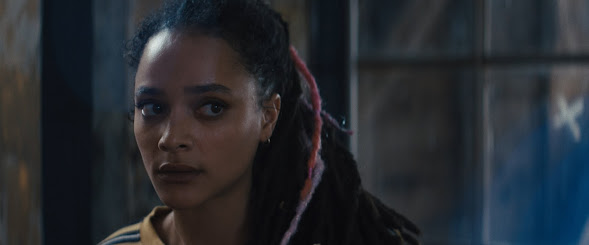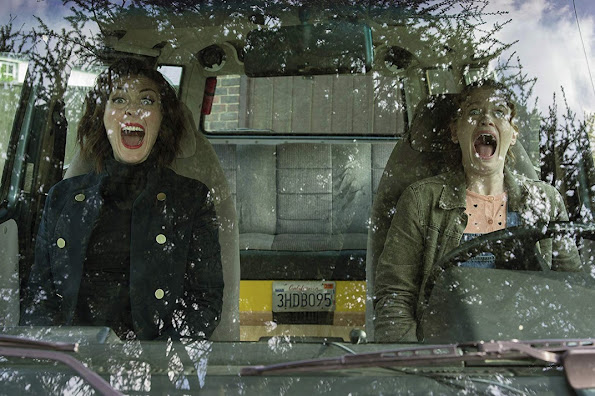Out now on blu-ray is two classic portmanteau horrors from the legendary British studio, Amicus. Starring a slew of British TV stars alongside more established and iconic genre actors like Peter Cushing and Christopher Lee, both Asylum and The House That Dripped Blood follow a similar structure in having a selection of short stories presented with one over-arching story to tie them (very loosely) together. Both of these titles were written by Robert Bloch, the author of Psycho, which should give you some idea of what to expect.
In The House That Dripped Blood, a Scotland Yard inspector arrives in town to investigate the disappearance of renowned horror actor Paul Henderson (Jon Pertwee), only to discover that his residence has a long history of mysterious deaths with no apparent link between them; and in Asylum, a young doctor must prove his eligibility for a vacant position by deducing which of the patients on the ward is his predecessor and would be employer, Dr. B. Starr, now also one of the "incurably insane".

They're hammy and Hammer-y in a number of great ways that the modern British film industry could learn a lot of lessons from. Firstly, the cast in both films in incredible, tapping a rich vein of British TV stars eager to make a move into films, rubbing shoulders with established names and those whose star was on the wain. Charlotte Rampling, Ingrid Pitt, Patrick Magee, Denholm Elliott, Geoffrey Bayldon (one of these films features Catweazel, whilst the other has Worzel Gummidge, so, something for everyone); I'm just scratching the surface of the talent that appears. Genre legend Peter Cushing features in both films in small roles, with his Hammer co-star Christopher Lee also popping up in The House... as a strict father whose sweet little daughter might be trying to kill him with voodoo. What is most enjoyable here is that given a role he can really (and thematically) sink his teeth into, both men are overshadowed by an incredibly fun performance by Worzel Gummidge and Doctor Who star Jon Pertwee as an ever so serious thespian who starts to become a vampire. His segment, the grand finale of The House... is the campest and funniest one across both films which do have wildly differing tones from sequence to sequence, the effect best described as chilling rather than outright scary. Still, for films fast approaching 50 years old they still are remarkably effective at planting an idea in your brain that will linger for a long while. Of the two films, the fun of the Jon Pertwee story gives The House... the slight edge over the much more dour Asylum, although they work well as a double bill due to their fragmented structure.

It's been said countless times before about portmanteau horrors, but they're often wildly inconsistent from act to act and can (usually) be fairly judged by their weakest sequence. Thankfully, neither film attempts to wow us with a ridiculous number of stories (hello, ABCs of Death), keeping it down to four or five smaller films and one thread to tie them to each other. It's part of the fun that these stories clearly have nothing to do with one another and the writers have gone to very little effort to find thematic links (the stories in The House... all take place in - drumroll, please - a house), but there is an enjoyable layer of mystery to Asylum's wraparound, as Robert Powell listens to the story of each patient to work out who among them was once a renowned psychiatric doctor, now just another potential killer. It's a ridiculous premise and as over the top as you'd expect from the author of Psycho, but it's a guessing game you'll find yourself playing along with all the way to the demonic toys filled finale.

The special features on both discs are a beaut, a particular highlight being the short archive documentary on the Asylum disc that shows how Amicus was operated out of what was essentially a shed on the backlot of Shepperton Studios by two men with big ideas and tight purse strings, clearly a precursor to the Blumhouse model of filmmaking. Both discs not only come with director commentaries and a surprising amount of extras, but also come with reversible sleeves with fantastic new artwork from the legendary artist Graham Humphreys, although it's hard not to spin the cover of The House That Dripped Blood, if only for the incredible tagline "Vampires! Voodoo! Vixens! Victims!".
Clearly the work of madmen with a touch of genius guiding them, both of these Amicus blu-rays offer some genuinely creepy chills and thrills and are essential for anyone interested in the history of horror.
Verdict
The House That Dripped Blood 3.5/5
Asylum 3/5
Special Features
The House That Dripped Blood
- Reversible sleeve
- Audio commentaries
- A Rated Horror Film - vintage featurette and interviews with director Peter Duffell and stars Geoffrey Bayldon, Ingrid Pitt & Chloe Franks
- Radio spots
- Stills gallery
- Trailers
Asylum
- Reversible sleeve
- Audio commentary
- Screenwriter David J. Schow on writer Robert Bloch
- Two's A Company - vintage featurette that visits the Amicus office at Shepperton Studios
- Inside The Fear Factory - featurette with directors Roy Ward Baker, Freddie Francis and producer Max J. Rosenberg
- Trailer































